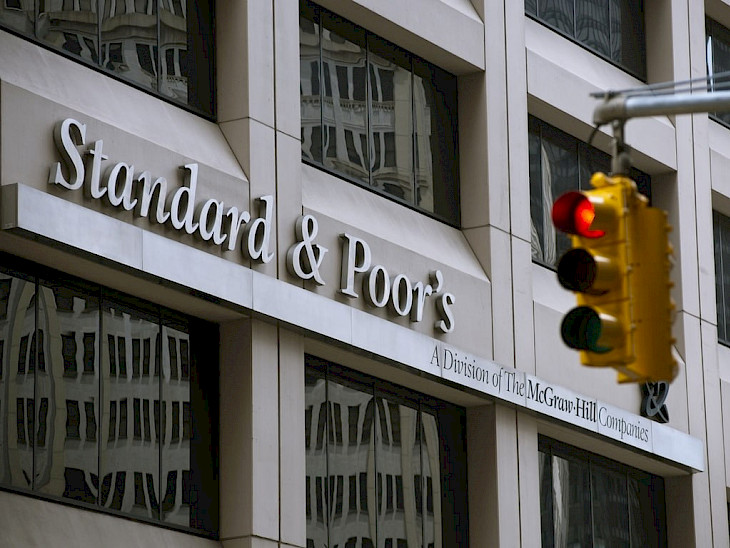The international rating agency Standard & Poor's Global Ratings has upgraded Tajikistan's long-term credit ratings for foreign and national currency obligations from "B-" to "B", AsiaPlus.tj reports.
"The agency has assigned Tajikistan a "stable outlook," the official website of S&P said in a statement.
S&P's long-term credit rating "B" means that the issuer is solvent, but adverse economic conditions may affect its ability and willingness to pay debts.
The agency's analysts attribute their assessment to "strong economic growth" and "containment of the budget deficit, which allows to keep the net debt burden at the level of "below a moderate 30% of GDP".
"Although gaps in management and transparency in state-owned enterprises remain, the new agreement of the International Monetary Fund will help to contain the associated risks of conditional liabilities," S&P specialists note.
In addition, it is emphasized that access to external concessional financing and relatively sufficient foreign exchange reserves should help the republic meet the requirements for repayment of Eurobonds and mitigate potential pressure on the balance of payments.
According to the Ministry of Finance, Tajikistan's public debt at the beginning of the second half of this year amounted to $3.6 billion, which is equal to 27.5% of GDP. In particular, $3.2 billion (88%) is external debt and about $400 million (12%) is domestic debt.
The country's gold and foreign exchange reserves at the beginning of this year amounted to 5.5 months of import coverage, which, according to the National Bank, exceeds the standards of sufficiency of international financial institutions for developing countries.
The vast majority of these reserves are foreign currency, including SDRs (Special Borrowing Rights - Reserve and Payment Facility of the International Monetary Fund) and an external investment portfolio.
Standard & Poor's, headquartered in New York, is one of the five reputable rating agencies in the world.
This organization, on the basis of the concluded bilateral agreement, is engaged in assigning a sovereign credit rating to Tajikistan. On the basis of the agreement, the agency assesses the economic situation and the degree of economic security of the country.
The agency's analytical report to the assigned rating is used to attract foreign investment and gives the republic access to international financial markets.
The international rating agency Standard & Poor's Global Ratings has upgraded Tajikistan's long-term credit ratings for foreign and local currency liabilities from "B-" to "B".
"The agency has assigned the republic a "stable forecast," the official website of S&P said.
S&P's long-term credit rating "B" means that the issuer is solvent, but adverse economic conditions may affect its ability and willingness to pay debts.
The agency's analysts attribute their assessment to "strong economic growth" and "containment of the budget deficit, which allows to keep the net debt burden at the level of "below a moderate 30% of GDP".
"Although gaps in management and transparency in state-owned enterprises remain, the new agreement of the International Monetary Fund will help to contain the associated risks of conditional liabilities," S&P specialists note.
In addition, it is emphasized that access to external concessional financing and relatively sufficient foreign exchange reserves should help the republic meet the requirements for repayment of Eurobonds and mitigate potential pressure on the balance of payments.
According to the Ministry of Finance, Tajikistan's public debt at the beginning of the second half of this year amounted to $3.6 billion, which is equal to 27.5% of GDP. In particular, $3.2 billion (88%) is external debt and about $400 million (12%) is domestic debt.
The country's gold and foreign exchange reserves at the beginning of this year amounted to 5.5 months of import coverage, which, according to the National Bank, exceeds the standards of sufficiency of international financial institutions for developing countries.
The vast majority of these reserves are foreign currency, including SDRs (Special Borrowing Rights - Reserve and Payment Facility of the International Monetary Fund) and an external investment portfolio.
Standard & Poor's, headquartered in New York, is one of the five reputable rating agencies in the world.
This organization, on the basis of the concluded bilateral agreement, is engaged in assigning a sovereign credit rating to Tajikistan. On the basis of the agreement, the agency assesses the economic situation and the degree of economic security of the country.
The agency's analytical report to the assigned rating is used to attract foreign investment and gives the republic access to international financial markets.
CentralasianLIGHT.org
August 20, 2024

